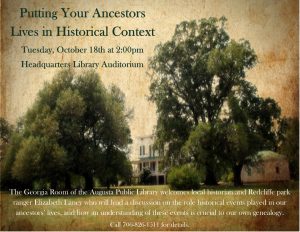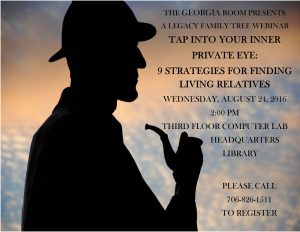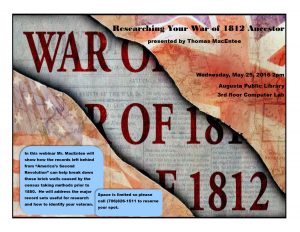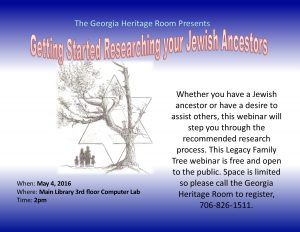Tuesday, October 25 @ 10:30 am
Photography History and Preservation: Views from the Augusta Museum of History
Third Floor Computer Lab-Headquarters Library
In honor of the Augusta Photography Festival which runs October 21-30, 2016 the Georgia Room will host a program on the history of photography, and the techniques one should use when preserving early photographs such as daguerreotypes, tintypes, and carte-de-visite. Ms. Lauren Virgo, Registrar of the Augusta Museum of History is our presenter, and will have examples on hand from the Museum’s collection. This event is free and open tothe public. Please call 706-826-1511 for details.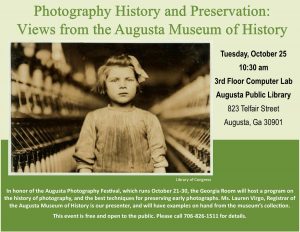
-
Recent Posts
Recent Comments
Archives
- February 2026
- January 2026
- December 2025
- November 2025
- October 2025
- September 2025
- August 2025
- July 2025
- June 2025
- May 2025
- April 2025
- March 2025
- February 2025
- January 2025
- December 2024
- November 2024
- October 2024
- September 2024
- August 2024
- July 2024
- June 2024
- May 2024
- April 2024
- February 2024
- January 2024
- August 2021
- June 2021
- February 2021
- January 2021
- December 2020
- October 2020
- September 2020
- May 2020
- April 2020
- March 2020
- January 2020
- December 2019
- May 2019
- March 2019
- December 2018
- November 2018
- October 2018
- July 2018
- June 2018
- May 2018
- February 2018
- January 2018
- October 2017
- September 2017
- August 2017
- June 2017
- May 2017
- April 2017
- March 2017
- February 2017
- December 2016
- October 2016
- September 2016
- August 2016
- July 2016
- May 2016
- April 2016
- March 2016
- February 2016
- January 2016
- December 2015
- November 2015
- October 2015
- September 2015
- August 2015
- July 2015
- June 2015
- May 2015
- April 2015
- March 2015
- February 2015
- January 2015
- December 2014
- November 2014
- October 2014
- September 2014
- August 2014
- July 2014
- June 2014
- May 2014
- April 2014
- February 2014
- January 2014
- November 2013
- October 2013
- September 2013
- August 2013
- July 2013
- June 2013
- May 2013
- April 2013
- March 2013
- February 2013
- January 2013
- December 2012
- November 2012
- October 2012
- September 2012
- August 2012
- July 2012
- June 2012
- May 2012
- April 2012
- March 2012
- February 2012
- January 2012
- December 2011
- November 2011
- October 2011
- September 2011
- August 2011
- July 2011
- June 2011
- May 2011
- April 2011
- March 2011
- February 2011
- January 2011
- December 2010
Categories
Meta

